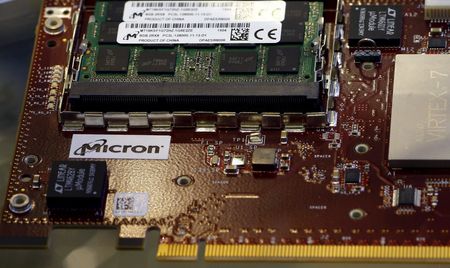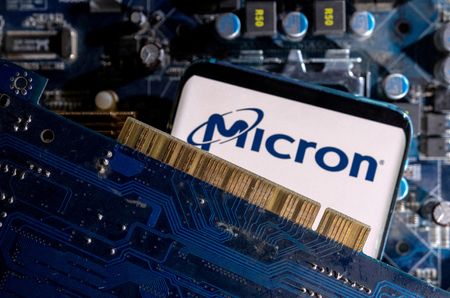BEIJING (Reuters) -China’s cyberspace regulator said on Sunday that products made by U.S. memory chipmaker Micron Technology Inc had failed its network security review and it would bar operators of key infrastructure from buying from the company.
The decision, announced amid a dispute over chip technology between Washington and Beijing, could include sectors ranging from telecoms to transport and finance, according to China’s broad definition of critical information infrastructure.
“The review found that Micron’s products have serious network security risks, which pose significant security risks to China’s critical information infrastructure supply chain, affecting China’s national security,” the Cyberspace Administration of China (CAC) said in a statement.
Micron said it had received the CAC’s notice of the conclusion of its review of the company’s products sold in China, and looks “forward to continuing to engage in discussions with Chinese authorities.”
The CAC neither provided details on what risks it had found nor what Micron products would be affected.
Jefferies analysts expected limited impact on Micron as its major customers in China are consumer electronics firms such as smartphone and computer manufacturers, not infrastructure suppliers.
“Since Micron’s DRAM and NAND products are much less in servers, we believe most of its revenue in China is not generated from telcos and the government. Therefore, the ultimate impact on Micron will be quite limited,” they said in a note.
Micron makes DRAM and NAND flash memory chips and competes with South Korea’s Samsung Electronics Co Ltd and SK Hynix Inc as well as Japan’s Kioxia, a unit of Toshiba Corp.
Shares in SK Hynix and Samsung rose 1% and 0.5% respectively early on Monday, while broader market rose 0.6%. Shares in Toshiba were flat.
The timing of the CAC’s announcement was important, coming during a summit of the Group of Seven (G7) leaders in Japan, said Christopher Miller, a professor at Tufts University and author of “Chip War: The Fight For The World’s Most Critical Technology.”
Micron announced last week a plan to invest up to 500 billion yen ($3.70 billion) in Japan in extreme ultraviolet technology, becoming the first chipmaker to bring the advanced chip manufacturing technology to the country that is now seeking to reinvigorate its chip sector.
U.S. President Joe Biden on Sunday said G7 nations had agreed to “de-risk and diversify our relationship with China.” The leaders also agreed to establish an initiative to counter economic “coercion.”
“This case could be an early test of the G7’s efforts on this front,” Miller said.
China announced its review of Micron’s products in late March. The company said at the time it was cooperating and that its business operations in China were normal.
In the dispute between the governments of the United States and China, Washington has imposed a series of export controls on chipmaking technology to China and moved to prevent Micron rival Yangtze Memory Technologies from buying certain American components.
U.S. officials, including members of a U.S. congressional select committee on competition with China, did not immediately respond to requests for comment.
Micron derives around 10% of its revenue from China, but it is not clear if the decision affects the company’s sales to non-Chinese customers in the country.
It generated $5.2 billion of revenue from China and Hong Kong last year, about 16% of its total revenue, according to Jefferies.
The larger chunk of Micron’s products flowing into China are being purchased by non-Chinese firms for use in products manufactured there, according to analysts.
China in September 2021 imposed rules aimed at protecting critical information infrastructure, which require their operators to comply with stricter requirements around areas such as data security.
Beijing has broadly defined the industries it considers “critical” as ones such as public communication and transport but it has not specified exactly what type of company or business scope this will be applied to.
(Reporting by Kevin Yao and Brenda Goh; Additional reporting by Andrew Chung in New York and Baranjot Kaur in Bengaluru; Editing by Lincoln Feast; Editing by Christopher Cushing)


